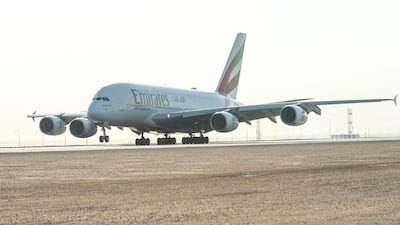Emirates, the world’s largest long-haul carrier, aims to grow its services to Canada on the back of proposals to increase the number of direct flights between the UAE and Canada and strengthen business ties.
"We have made no secret that we would like to expand our operations in Canada to meet growing passenger demand. At this time, there are ongoing government discussions and we will evaluate all opportunities," an Emirates spokeswoman told The National via email.
UAE Economy Minister Sultan Al Mansouri met Canadian Minister of Transport Marc Garneau last week and discussed joint co-operation in aviation and air services. The discussions are a significant step forward in bilateral relations between the two countries, after Canada refused to grant more landing rights to UAE airlines in 2010 despite protracted negotiations, largely due to objections from its national carrier Air Canada.
“Emirates has wished to fly to Vancouver for quite some time but has been prevented from doing so because of restrictions in bilateral air rights,” said John Strickland, director of aviation consultancy JLS Consulting. “Instead, Seattle, just across the US border, has seen the benefits of a direct Dubai service. It’s time for Canada to catch up.”
Under a 1999 agreement, the UAE is allowed to operate six flights per week to and from Canada. Emirates operates three weekly flights from Dubai to the Canadian capital Toronto using its Airbus A380. Etihad operates three flights a week between Abu Dhabi and Toronto, while Air Canada has operated a thrice-weekly service between Toronto and Dubai since 2015.
But the UAE government has argued that with an estimated 45,000 Canadians living in the country, and a significant trade relationship — the UAE is Canada’s largest export market in the Middle East and North Africa accounting for $1.79 billion of exports in 2016 – six flights a week to one Canadian city is not enough.
The UAE has made moves to strengthen economic ties with Canada, such as establishing the UAE-Canada Business Council. More recently, Canada has said it will introduce visa-free travel for Emiratis from June 5. UAE foreign direct investment flows into Canada totalled $9.6bn in 2015, according to the website of the Canadian Embassy in the UAE.
The new proposals have been welcomed by aviation analysts after the UAE’s ambassador to Canada, Fahad Al Raqbani, said increasing direct flights would shorten geographical distances, deepen ties between business communities, and increase the volume of trade and tourism.
_____________________
Read more:
UAE and Canada explore increasing direct flights at ministerial meeting
Emiratis to enjoy visa-free travel to Canada
American Airlines assessing impact of US-UAE Open Skies deal
_____________________
“An opening up of air services between the UAE and Canada would be a very positive move – I would certainly expect to see the introduction of more frequencies and new destinations by UAE carriers,” Mr Strickland added.
Will Horton, senior analyst at the Centre for Aviation, said UAE carriers “will always see more demand to Canada than Canadian carriers will need to the UAE."
“This will not be full liberalisation, but it is a marked improvement in relations,” he said. “There are promising signs that Canada is gradually refocusing its aviation framework to put at the forefront consumers and the national interest, not just the narrow scope of its local airlines.”
Last month, a long-running dispute between the ‘Big Three’ US carriers and their Arabian Gulf counterparts, Emirates, Etihad and Qatar Airways, was resolved when the Open Skies agreements permitting their expansion in the US was affirmed. Analysts said the Canada conversations would give a boost to any plans by Emirates and Etihad to launch new services to the US.
“If we see increased flight frequency to Canada, [the country] should act as a viable sustainable gateway for destinations in the US,” said Mark Martin, founder and chief executive of Martin Consulting. The strategy would also benefit Canadian airports with increased income from flights and ground operations.
For Emirates, its codeshare with Alaska Airlines would help it extend coverage across the Pacific Northwest, potentially linking customers beyond Seattle into Vancouver via direct flights, and other gateways in the Canadian states of British Columbia and Alberta. “The permutations for business opportunity are very good if extra flights are deployed,” said Saj Ahmad, chief analyst at Strategic Aero Research. “Canada is a very big market that Emirates hasn’t been able to exploit due to the flight number constraints.”
The story might not be the same for Etihad Airways, which is undertaking a wide-ranging operational and network review, he added. It is not clear whether Etihad would immediately increase Canadian flights if permission were granted, and Etihad declined to comment on its Canada strategy.

